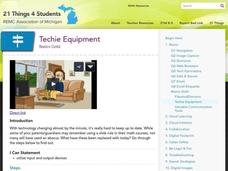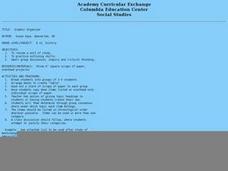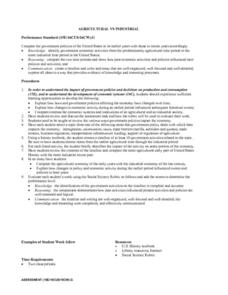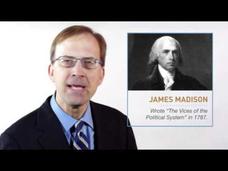Curated OER
Bridging the gap between the U.S. and Cuba
Eleventh graders examine the events that led to the strained relationship between Cuba and the United States. For this US History lesson, 11th graders create an illustrated timeline of Cuba-U.S. relations. Students write an essay...
Curated OER
How Did the Progressive Party affect American Society
Ninth graders explore the political views of the Progressive Party. In this U.S. History lesson, 9th graders read the "LaFollette Platform," then share their thoughts of the reading in a class discussion. To conclude the lesson, students...
Curated OER
Sectionalism in Early U.S.
Students, divided into three groups, representing the Northeastern, Southern, Western United States. They research these areas in early American history and as a group prepare charts, graphs and reports. They explain their needs and...
Digital History
The Crisis of 1833: Tariffs and Nullification
This resource offers a detailed review of the events that led South Carolina to nullify the Tariffs of 1828 and 1832, as well as to pass the Nullification Ordinance, which questioned the federal government's authority to enforce any law...
Curated OER
The 1932 Election: A Turning Point in History
Young scholars discuss the presidential election in 1932. In this U.S. history lesson plan, students compare and contrast the differences between the Hoover administration and the administration of FDR. Young scholars work in groups and...
Curated OER
Clay, Calhoun & Webster
In this United States history activity, students utilize a word bank of 10 terms or phrases to answer 10 fill in the blank questions about the nation's early history. A short answer question is included as well.
Curated OER
The Jeffersonian Age: 1800 - 1824 (5)
In this online interactive American history worksheet, students answer 15 fill in the blank questions regarding the Jeffersonian Age. Students may submit their answers to be scored.
Bill of Rights Institute
Economics of the North and South Before the Civil War
How did economic issues lead to war? Viewers watch an AP review video to examine one of the main causes of the American Civil War, the Tariff of Abominations. They examine the issues concerning the economies of the North and South prior...
Curated OER
Captains or Barrons?
For this United States history worksheet, students utilize a word bank of 10 terms or phrases to answer 10 fill in the blank questions pertaining to the rise of industry in nation. A short answer question is included as well.
Curated OER
Woodrow Wilson
In this online interactive history worksheet, students respond to 10 short answer and essay questions about the achievements of Woodrow Wilson. Students may check some of their answers on the interactive worksheet.
Curated OER
James K. Polk
In this online interactive history worksheet, students respond to 10 short answer and essay questions about James K. Polk. Students may check some of their answers on the interactive worksheet.
Curated OER
Graphic Organizing: Early American History
In collaborative groups, young US historians sort cards (each labeled with a single early American event or issue) according to which of the first four presidents was leading the country at the time. Learners copy the events onto a...
Council for Economic Education
Trade in Colonial America / NAFTA
Learners learn the how trade impacted the colonial economy. They analyze the the benefits of NAFTA and learn the advantages to both the United States and Mexico.
Curated OER
Agricultural and Industrial Policies of the U.S.
Students examine the impact of laws and government policies on the agricultural and industrial economic systems. From a list of topics, they select one area and create timelines of at least ten related government activities. In...
Curated OER
President William McKinley
In this US history worksheet, students read a biography about President William McKinley and answer 6 multiple choice questions.
Bill of Rights Institute
Interstate Commerce and the Constitution
Who had power over trade in the early days of the United States? Who has power now? Viewers investigate the Commerce Clause of the United States Constitution. Using an AP Exam review video, learners examine issues surrounding authority...
National Endowment for the Humanities
Women's Lives Before the Civil War
Women's lifestyles before the Civil War made a huge impact as a point of causation. Give middle schoolers the opportunity to view firsthand the lives of women before the Civil War. They analyze primary source documents, view photographs,...
Curated OER
King Andrew And His Critics
In this United States history worksheet, students utilize a word bank of 10 terms or phrases to answer 10 fill in the blank questions about the Andrew Jackson and his critics. A short answer question is included as well.
National Endowment for the Humanities
Factory vs. Plantation in the North and South
North is to factory as South is to plantation—the perfect analogy for the economy that set up the Civil War! The first lesson in a series of five helps teach beginners why the economy creates a driving force for conflict. Analysis of...
Curated OER
American Becomes a Colonial Power
Exploring the idea of America joining "the imperialist club" at the end of the 19th century, this presentation presents reasons why America not only had the drive to explore the world, but the power and wealth with which to do so....




